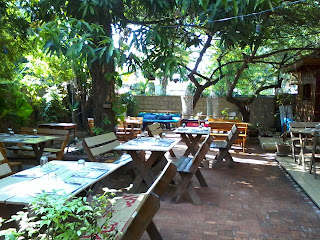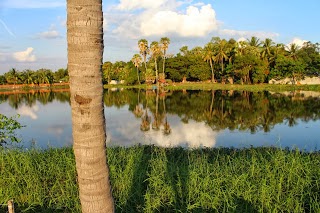Tucked away on a road parallel to the Mekong, just west of the city core is a magical kingdom.
Kong Khao
This is its latest incarnation.
Pierre, Isa and Valentin have brought the poetry and calm of the Great French South West to this little corner of Indochina.
The food. The food! Pierre is an executive chef from a village tucked in the French Department of Tarn et Garonne, an area famous for its duck confits and heady wines, perfumed cheeses and damning deserts. It is an area I know well and in all my days of travelling outside the French Southwest – even to Paris – I have found it impossible to find a good confit de canard. But here, somehow, miraculously, Pierre makes it happen.
On the day they opened I had a concoction of local mushrooms called a declanation de champignons laos and an ominous sounding confit de joue de porc aux épices. I have rarely eaten better in France and certainly have never eaten better outside of France. Sitting there, in that garden, I could close my eyes and allow the taste-bud memories flow through me, evoking the rolling vineyards and ancient castles of the French Southwest, her gentle rivers and little stone houses. The mushrooms were just that perfect texture where fry meets fresh; biting into them was like taking a sensorial voyage through all dimensions of mother earth. The pork jowls were sinful – deep and rich and cunning in the way the flavours blended and danced in my mouth. Dessert was lemon pie, home made; tangy, tarty, vibrant fresh and alive.
One detail many restaurants outside the Métropole miss time and again is an inexpensive house wine and I have had to avoid some otherwise good restaurants here because of it, but these guys have managed to find a fabulous red, a dry baby with just the body and soul needed to espouse the cuisine.
The garden is beautiful, the colours satisfying, the music is wonderful and not too loud ... And the prices are painless.
To reserve call Pierre at 020 54 67 60 65, or Isa at 020 54 75 86 45
Open from lunch on Wednesday till brunch on Sunday. Credit cards not accepted.





























































